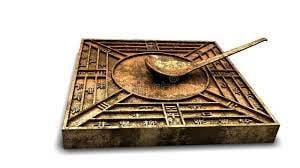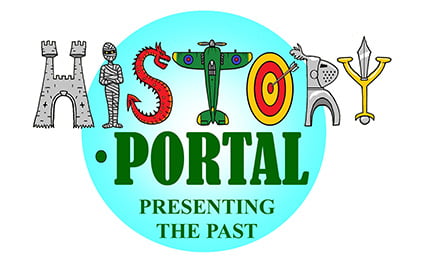 Well, we do know that the Chinese were known to use a magnetic compass during the Han Dynasty between the 2nd century BC and 1st century AD. Like the one on the left. It wasn’t for navigation, no, they used them for fortune-telling! Then for divination, a way of finding the unknown by supernatural means.
Well, we do know that the Chinese were known to use a magnetic compass during the Han Dynasty between the 2nd century BC and 1st century AD. Like the one on the left. It wasn’t for navigation, no, they used them for fortune-telling! Then for divination, a way of finding the unknown by supernatural means.
This first compass was used as a form of feng shui to point people in the right direction. This was very important for the Chinese as it helped people to order and harmonize their environments and lives.
It used lodestone, a natural permanent magnet, formed in the shape of a spoon put on a flat, square-shaped plate made of bronze, meant to represent the Earth. Due to it’s magnetism the handle of the spoon always pointed south.
When was it first used on ships?
Around 1040 that the Chinese twigged that the magnetic compass could be used by the military for navigation. Somewhere between 1111 and 1117 they started using it for maritime navigation. Unfortunately, until 1125 the records are unclear, but from that date do we have evidence of the Chinese using it as a navigational tool.
In those days a compass was simply a magnetic needle floating in a bowl of water.
Now it gets interesting, as it appears that the Chinese weren’t the only ones floating a needle on water. A needle floating in waterwass being used by European sailors and Arabs on their dhowes in the Persian Gulf. I am sure if you investigated sailors on the other continents, they were all using something similar.
So, who invented the compass?
I don’t think a single person did, I believe that the compass evolved at the same time all round the world once they understood magnetics, for example in:.
- In Greece 4,000 years ago. A shepherd, Magnes, while looking after his sheep found the nails in his shoes were stuck to the rock he was standing on!
- In Rome – Pliny the Elder, a Roman author wrote about a hill that attracted iron. He thought it was magic.
- In Scandinavia as early as 1,000 B.C., the Vikings were using an iron needle floating on water to indicate north and south.
- Chinese may have developed a similar compass around 800 A.D.
- What we do know is the 13th Century Italian explorers like Marco Polo brought the floating compass back to Italy and Europe.
They weren’t perfect.
This became obvious as European sailors started exploring the rest of the world in the 15th century. As they came across a problem. They found that the “north” on their compass was not pointing to the north as they understood it, which they then called the true north. They called this difference “the variation” or the clever ones “the magnetic declination”.
As well as showed them North in a different place, it kept changing depending on where they were.
For example, it wasn’t a problem when you were near the equator but the further north you went, the bigger the difference became. This meant that when travelling north you had to keep adjusting your compass readings to take this difference into account. They used “The Rectifier” in conjunction with their charts and the position of the sun.
Thinks changed again, when we started making steel ships, as the magnetism in the steel changed the readings! This they called a deviation. They came up with mad ideas to increase the accuracy of their readings, such as putting soft iron balls or bar magnets near the compass. None of them worked so in the end they produced endless tables to help navigators compensate for the difference.
Naturally, when the airplane came along, they had to create a different deviation, especially once planes were made of metal.
Therefore, the answer to the question is that no single individual invented the compass, it evolved across the world around the 12th century.
Now, of course, we have SatNav and global positioning satellites, which after thousands of years will eventually make the compass redundant?
Isn’t history fun?
10 questions to discuss:
- Beyond fortune-telling: In addition to feng shui, were there other practical uses for the compass in ancient China besides navigation?
- Technical evolution: How did the design of the compass change from the lodestone spoon to the floating needle version used by sailors?
- Evidence of independent invention: Are there any specific clues suggesting the independent development of the compass in different cultures, beyond the use of floating needles?
- Maritime impact: How did the adoption of the compass by Chinese and European sailors lead to advancements in navigation and exploration?
- Magnetic variation: How did sailors understand and cope with the phenomenon of magnetic declination during early voyages?
- Iron ships and deviation: What specific challenges did the magnetism of steel ships pose for compass accuracy, and how were these addressed?
- Alternative solutions: Besides “mad ideas” like magnets, were there any more scientific attempts to improve compass accuracy throughout history?
- Beyond ships and planes: Are there any modern applications of the magnetic compass outside of traditional navigation contexts?
- SatNav and limitations: Despite the rise of GPS, are there any situations where a traditional compass still proves valuable or even irreplaceable?
- Future of the compass: Do you think the compass will ever truly become obsolete, or might it maintain a place in navigation or cultural significance even in a GPS-dominated world?
These questions are to encourage further exploration by delving into the cultural, technical, and practical aspects of the compass’s development and use throughout history. They are also invite speculation on its potential future relevance in an increasingly tech-driven world.
For more on this go to:
https://www.nationalgeographic.org/encyclopedia/compass/
https://www.dowlingmagnets.com/blog/2016/who-discovered-the-very-first-magnet/
© Tony Dalton

